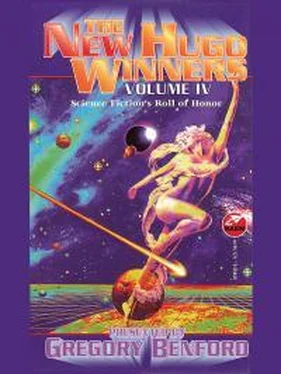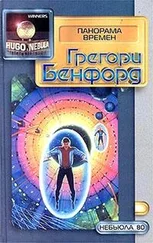Грегори Бенфорд - The New Hugo Winners - Volume IV
Здесь есть возможность читать онлайн «Грегори Бенфорд - The New Hugo Winners - Volume IV» весь текст электронной книги совершенно бесплатно (целиком полную версию без сокращений). В некоторых случаях можно слушать аудио, скачать через торрент в формате fb2 и присутствует краткое содержание. Год выпуска: 1997, ISBN: 1997, Издательство: Baen, Жанр: Фантастика и фэнтези, на английском языке. Описание произведения, (предисловие) а так же отзывы посетителей доступны на портале библиотеки ЛибКат.
- Название:The New Hugo Winners - Volume IV
- Автор:
- Издательство:Baen
- Жанр:
- Год:1997
- ISBN:0-671-87852-2
- Рейтинг книги:5 / 5. Голосов: 1
-
Избранное:Добавить в избранное
- Отзывы:
-
Ваша оценка:
- 100
- 1
- 2
- 3
- 4
- 5
The New Hugo Winners - Volume IV: краткое содержание, описание и аннотация
Предлагаем к чтению аннотацию, описание, краткое содержание или предисловие (зависит от того, что написал сам автор книги «The New Hugo Winners - Volume IV»). Если вы не нашли необходимую информацию о книге — напишите в комментариях, мы постараемся отыскать её.
The New Hugo Winners - Volume IV — читать онлайн бесплатно полную книгу (весь текст) целиком
Ниже представлен текст книги, разбитый по страницам. Система сохранения места последней прочитанной страницы, позволяет с удобством читать онлайн бесплатно книгу «The New Hugo Winners - Volume IV», без необходимости каждый раз заново искать на чём Вы остановились. Поставьте закладку, и сможете в любой момент перейти на страницу, на которой закончили чтение.
Интервал:
Закладка:
"Our contract states—"
"That I am to interfere in the proceedings in no way. It does not say I cannot watch quietly."
"You'll get upset if you do. This is the way preparing a compu-drama works. There are lots of glitches to overcome and it would be upsetting to the company to have the author watching and disapproving."
"I'm not disapproving. I'm here only to answer questions if you care to ask them."
"Questions? What kind of questions?"
Laborian shrugged. "I don't know. Something might puzzle you and you might want a suggestion."
"I see," said Willard, with heavy irony, "so you can teach me my business."
"No, so I can answer your questions."
"Well, I have one."
"Very well," and Laborian produced a small cassette recorder. "If you'll just speak into this and say that you are asking me a question and wish me to answer without prejudicing the contract, we're in business."
Willard paused for a considerable time, staring at Laborian as though he suspected trickery of some sort, then he spoke into the cassette.
"Very well." said Laborian. "What's your question?"
"Did you have anything in mind for the appearance of the triple-being in the book?"
"Not a thing," said Laborian, cheerfully.
"How could you do that?" Willard's voice trembled as though he were holding back a final "you idiot" by main force.
"Easily. What I don't describe, the reader supplies in his own mind. Each reader does it differently to suit himself, I presume. That's the advantage of writing. A compu-drama would have an enormously larger audience than a book could have, but you must pay for that by having to present an image."
"I understand that," said Willard. "So much for the question, then."
"Not at all. I have a suggestion."
"Like what?"
"Like a head. Give the triple-being a head. The Parental has no head, nor the Rational, nor the Emotional, but all three look up to the triple-beings as creatures of intelligence beyond their own. That is the entire difference between the triple-beings and the three Separates. Intelligence."
"A head?"
"Yes. We associate intelligence with heads. The head contains the brain, it contains the sense organs. Omit the head and we cannot believe in intelligence. The headless oysters or clams are mollusks that seem no more intelligent to us than a spring of grass would be, but the related octopus, also a mollusk, we accept as possibly intelligent because it has a head—and eyes. Give the triple-being eyes, too."
Work had, of course, ceased on the set. Everyone had gathered in as closely as they thought judicious to listen to the conversation between director and author.
Willard said, "What kind of head?"
"Your choice. All you need is a bulge suggesting a head. And eyes. The viewer is sure to get the idea."
Willard turned away, shouting, "Well, get back to work. Who called a vacation? Where are the imagists? Back to the machine and begin trying out heads."
He turned suddenly and said, in an almost surly fashion, to Laborian. "Thank you!"
"Only if it works," said Laborian, shrugging.
The rest of the day was spent in testing heads, searching for one that was not a humorous bulge, and not an unimaginative copy of the human head, and eyes that were not astonished circles or vicious slits. Then, finally, Willard called a halt and growled, "We'll try again tomorrow. If anyone gets any brilliant thoughts overnight, give them to Meg Cathcart. She'll pass on to me any that are worth it." And he added, in an annoyed mutter, "I suppose she'll have to remain silent."
Willard was right and wrong. He was right. There were no brilliant ideas handed to him, but he was wrong for he had one of his own.
He said to Cathcart, "Listen, can you get across a top hat?"
"A what?"
"The sort of thing they wore in Victorian times. Look, when the Parental invades the lair of the triple-beings to steal an energy source, he's not an impressive sight in himself, but you told me you could just get across the idea of a helmet and a long line that will give the notion of a spear. He'll be on a knightly quest."
"Yes, I know," she said, "but it might not work. We'll have to try it out."
"Of course, but that points the direction. If you have just a suggestion of a top hat, it will give the impression of the triple-being as an aristocrat. The exact shape of the head and eyes becomes less crucial in that case. Can it be done?"
"Anything can be done. The question is: will it work?"
"We'll try it."
And as it happened, one thing led to another. The suggestion of the top hat caused the voice-recorder to say, "Why not give the triple-being a British accent?"
Willard was caught off-guard. "Why?"
"Well, the British have a language with more tones than we do. At least, the upper classes do. The American version of English tends to be flat, and that's true of the Separates, too. If the triple-being spoke British rather than English, his voice could rise and fall with the words—tenor and baritone and even an occasional soprano squeak. That's what we would want to indicate with the three voices out of which his voice was formed."
"Can you do that?" said Willard.
"I think so."
"Then we'll try. Not bad—if it works."
It was interesting to see how the entire group found themselves engaged in the Emotional.
The scene in particular where the Emotional was fleeing across the face of the planet, where she had her brief set-to with the other Emotionals caught at everyone.
Willard said tensely, "This is going to be one of the great dramatic scenes. We'll put it out as widely as we can. It's going to be draperies, draperies, draperies, but they must not be entangled one with the other. Each one must be distinct. Even when you rush the Emotionals in toward the audience I want each set of draperies to be a different off-white. And I want Dua's drapery to be distinct from all of them. I want her to glitter a little, just to be different, and because she's our Emotional. Got it?"
"Got it," said the leading imagist. "We'll handle it."
"And another thing. All the other Emotionals twitter. They're birds. Our Emotional doesn't twitter, and she despises the rest because she's more intelligent than they are and she knows it. And when she's fleeing—" he paused, and brooded a bit. "Is there any way we can get away from the 'Ride of the Valkyries'?"
"We don't want to," said the soundman promptly. "Nothing better for the purpose has ever been written."
Cathcart said, "Yes, but we'll only have snatches of it now and then. Hearing a few bars has the effect of the whole, and I can insert the hint of tossing manes."
"Manes?" said Willard, dubiously.
"Absolutely. Three thousand years of experience with horses has pinned us down to the galloping stallion as the epitome of wild speed. All our mechanical devices are too static, however fast they go. And I can arrange to have the manes just match, emphasize, and punctuate the flowing of the draperies."
"That sounds good. We'll try it."
Willard knew where the final stumbling block would be found. The last melting. He called the troupe together to lecture them, partly to make sure they understood what it was they were all doing now, partly to put off the time of reckoning when they would actually try to put it all into sound, image, and sublimination.
He said, "All right, the Emotional's interest is in saving the other world—Earth—only because she can't bear the thought of the meaningless destruction of intelligent beings. She knows the triple-beings are carrying through a scientific project, necessary for the welfare of her world and caring nothing for the danger into which it puts the alien world—us.
"She tries to warn the alien world and fails. She knows, at last, that the whole purpose of melting is to produce a new set of Rational, Emotional and Parental, and then, with that done, there is a final melting that would turn the original set into a triple-being. Do you have that? It's a sort of larval form of Separates and an adult form of triples.
Читать дальшеИнтервал:
Закладка:
Похожие книги на «The New Hugo Winners - Volume IV»
Представляем Вашему вниманию похожие книги на «The New Hugo Winners - Volume IV» списком для выбора. Мы отобрали схожую по названию и смыслу литературу в надежде предоставить читателям больше вариантов отыскать новые, интересные, ещё непрочитанные произведения.
Обсуждение, отзывы о книге «The New Hugo Winners - Volume IV» и просто собственные мнения читателей. Оставьте ваши комментарии, напишите, что Вы думаете о произведении, его смысле или главных героях. Укажите что конкретно понравилось, а что нет, и почему Вы так считаете.








